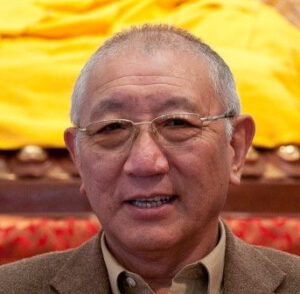We are incredibly fortunate to have the visit of H. E. Dagyab Rinpoche in May at both Jewel Heart Ann Arbor (May 18-23, 2018) and Jewel Heart New York (May 26-27, 2018). As such, we highlight points 18-33 out of 52 topics for contemplation in the 2005 Tibethaus publication, BEING A GOOD HUMAN BEING (Some Fundamental Thoughts on Human Communication). The link to the first post based on this is here: https://www.jewelheart.org/blog/dagyab-rinpoche-being-a-good-human-being/
II. Enemies/Friends
18. “Love is the best means to tame the opponent/enemy,” said the Kadampa Geshe Khamlungpa.
19. How can I think about others if I am not even able to think about myself? First, I need to learn what is right and wholesome for me. But it would be wrong to think that I need to cling to my ego, because it can offer me no sup- port at all.
20. Why do I need to think about others so much? Because it will only benefit MYSELF. All my opportunities and my happiness depend on the support of others.
21. I like it when others are kind and friendly, understanding, considerate and warm-hearted towards me. Therefore I must be just as nice and friendly, etc., to them. “You get what you give.” Cultivating friendly behavior in myself without putting up a false front is much wiser.
22. In case I absolutely have to have enemies, then I definitely should regard others with hostility! If it is beneficial for me. But is it really beneficial for me?
23. Perhaps I have to force myself to be friendly at the beginning. No problem. Such friendliness becomes genuine at some point (simply) by my becoming accustomed to it.
24. Friendliness, attentiveness and openness are the authentic and natural qualities of the mind, because they are peaceful. The opposite attitudes are artificial and temporary qualities. They have arisen from temporary causes and are destructive.
25. Whenever I help others I do so gladly. However, I should expect no reward, not even a “thank you.” Otherwise I shall have programmed an injury. Friendship is no business deal!
26.Too many expectations and excessive scepticism are obstacles.
27. It is wrong to stop helping others the instant I fail to receive appreciation from them.
28. My helping others is the cause for my receiving help from others in the future.
29. If I speak badly about someone I (only) show that I am a bad person, myself.
30. If I really have no other option but to distance myself from someone, I should always do so without hurtful words or hatred (towards him or her).
31. I should first look for faults within myself before looking for faults in others.
32. The cause of my problems lies within myself, no matter where I am and whom I am with.
33. I do not recognize my own serious faults, but I spot minor faults in others. their failings that I notice for the most part, because that is what I pay attention to. By doing so I ignore or downplay their good qualities. At the same time, I mostly see my friends’ good qualities and ignore or downplay their failings. This is disgraceful!
Excerpt from Dagyab Rinpoche’s book – Being A Good Human Being (Some Fundamental Thoughts on Human Communication), published by Tibethaus 2005


